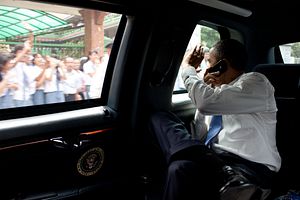Most of the headlines emerging following U.S. President Barack Obama’s much-anticipated keynote address at the 4th Congress of the Indonesian Diaspora last week in Jakarta – his first in Asia since leaving office – naturally focused on his remarks that concerned Indonesia more specifically. But though Obama’s speech certainly included issues related to Indonesia in particular, it also had a broader message about addressing the challenges brought about by globalization and technological change that he has sought to spread in his post-presidency so far.
Like many of his other speeches, Obama’s address at the conference – a biennial event established and led by the Indonesian Diaspora Global Network chairman and former U.S. Ambassador to Indonesia Dino Patti Djalal – was wide-ranging. And unsurprisingly, it included a lot of references to Indonesia, where he had briefly grown up with his family from 1967 to 1971 and had returned on a ten-day holiday with his wife and daughters on this trip. Indeed, at various points, Obama broke into Bahasa Indonesia, repeatedly producing large rounds of applause among the audience.
Much of the media coverage of Obama’s speech centered on his statements about Indonesian moderation and tolerance, which was no surprise considering the lingering concerns on this score following the Jakarta gubernatorial elections held in May (See: “Is Political Islam Really on the Rise in Indonesia?”). And, to be sure, Obama did dwell on the country’s tolerance, pluralism, and religious diversity – noting the country’s constitution, religious monuments, and even the tolerant views of his own Indonesian stepfather – even as he warned that this reputation ought not to be taken for granted. Obama’s meeting with Jakarta’s governor-elect Anies Baswedan – who had tarnished his reputation as a progressive, pluralist candidate by courting radical voices to garner conservative votes during his victory in the May election – was also scrutinized (See: “The Trouble With Indonesia’s Ahok Test“).
Yet it is also worth emphasizing that the main point of Obama’s speech was a much broader one that he has repeated often during his post-presidency thus far: that we ought to acknowledge both the opportunities as well as the challenges that globalization and technological change can bring to various groups in society, whether it be rising inequality, job losses due to automation, or rising polarization and fracturing of the media environment that can disincentivize young people from getting involved in politics.
This theme is by no means new. It is one that Obama and his administration had begun to address towards the end of his presidency when the rise of populism began to take hold – whether it be his farewell address to the United Nations last September or its “Future of Artificial Intelligence Initiative” that examined, among other things, the impact of AI on the U.S. economy and jobs. And it is one that he has continued to harp on in his post-presidency.
In a speech at the Montreal Chamber of Commerce back in June and in remarks after receiving the Profile in Courage Award at the John F. Kennedy Presidential Library and Museum in Boston in May, Obama acknowledged that during times of disruption, some may be tempted to revert to isolationism and nationalism and call for the reduction of the rights of others or a retreat to within borders or tribe. And speaking at a global food and innovation summit in Milan in May, Obama urged the audience to pay attention to – from automation to inequality – lest there by backlash and resistance by those who feel left behind.
Obama has also been attentive to the effects of globalization and technological change on the youth and their civic engagement. For instance, during a session with young leaders at the University of Chicago in late April, his first public remarks since leaving the presidency, Obama said that one of his concerns was how to break down barriers that would prevent the youth from participating in politics. The conversation that he had with the young leaders on stage touched on several of these, be it rising polarization or media fragmentation.
This broader theme no doubt played out during Obama’s Indonesia speech as well. Indeed, he framed his speech around the fact that the world was at a “crossroads,” with countries like Indonesia enjoying greater prosperity from increasing globalization and technological advancement but also challenges. And rather than just praise Indonesia unconditionally, he made it clear that values like tolerance needed to be cultivated and nurtured, including among the youth, and that the “fight for those values against those who promote intolerance” was an “important part of Indonesia’s future.”
And apart from delivering the address and meeting a number of officials during his visit to Indonesia — including President Joko “Jokowi” Widodo — Obama also hosted a small roundtable with young Indonesian leaders as he has looked to do in other international visits including in Germany back in May. These events are part of his ongoing work to develop the Obama Foundation which he intends to serve as a way to develop the next generation of active citizens and emerging young leaders.
As Obama continues on his engagements in his post-presidency, we are likely to continue to see him deliver speeches and attend events similar to those in Indonesia. Though these will naturally be customized for the countries he visits, it is important to keep the broader message he has been trying to convey in mind.

































